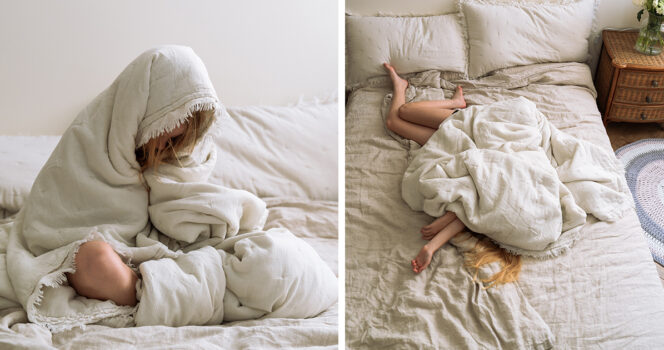
Gen Z has often been called the laziest generation – and surprisingly, they seem to agree. But just when you thought they’d reached peak apathy, they fired up the internet with a trend called bed rotting – sloth-like indulgence that health experts warn could have a negative impact on mental health.
In a 2024 Newsweek article, most generations – Boomers, Gen X, and even Millennials – agree that Gen Z is the laziest. But what’s shocking is that the generation – born between 1997 and 2012 – also agrees. They’re not trying to change the narrative, instead, they’re leaning into it, swaddling themselves in blankets and choosing not to participate in the hustle.
And now, they’re going viral for their slothfulness with a new social media trend called bed rotting.
What is bed rotting?
If you’ve ever spent an entire weekend under your covers, scrolling endlessly on TikTok, binge-watching Netflix, dodging texts, and ignoring every responsibility in your life, then you’ve already experienced bed rotting.
According to the Sleep Foundation, bed rotting is a buzzword that describes a “self-care trend that involves staying in bed for a full day or even an entire weekend.”
Coined and popularized on TikTok in late 2023, bed rotting is essentially a form of digital-age hibernation. The American Academy of Sleep Medicine reports that 24% of Gen Zers engage in the trend, while 27% say they stay in bed for over half an hour after waking – just to avoid starting the day.
‘Behavioral shutdown’
It may sound like harmless self-care, but experts warn that bed rotting could be quietly wrecking your mental health.
According to Dr. Sudhir Kumar, Senior Neurologist at Apollo Hospital, the trend doesn’t just mess with your mood – it can disrupt critical brain chemicals that “lowers serotonin levels – which are linked to mood and happiness.”
“Neurologically, bed rotting can be seen as a kind of behavioural shutdown,” Dr. Kumar told South First. “It’s a sign that the brain’s usual motivation and reward systems are slowing down – something we also see in chronic stress or depression.”
‘Symptom of something deeper’
Agreeing that excessive time in bed can indicate a deeper issue, Dr. Subhash HJ, a counsellor and mental health educator, told South First: “Bed rotting isn’t a disorder in itself, but it can be a symptom of something deeper – like depression, anxiety, or burnout. If someone finds themselves doing it often and feeling stuck, it’s important they talk to a mental health professional.”
That’s not all. The Sleep Foundation explains that lying in bed too long, especially while scrolling or watching TV, can condition the brain to associate your bed with wakefulness rather than sleep. This can lead to insomnia, poor sleep quality, and even long-term sleep disorders.
Social interaction and isolation
The dark side of bed rotting isn’t just about sleep – it’s about what it replaces, experts say.
When you spend long stretches in bed, you’re not engaging in social interaction, movement, or sunlight exposure – all things that are vital for good mental and physical health. Prolonged inactivity can lead to deconditioning, a process where muscle strength and stamina decrease. While this is typically associated with illness or hospitalization, it can also occur from simple sedentary behavior.
Social isolation is another major concern. The more time people spend alone in bed, the less connected they feel to others. And as studies have repeatedly shown, social connection is a key factor in maintaining mental health. Without it, symptoms of depression and anxiety can intensify.
Is there any benefit to bed rotting?
Some mental health advocates argue that bed rotting allows people to pause, breathe, and escape from the endless demands of modern life. For those struggling with burnout or chronic stress, taking a day to rest can be incredibly healing. It also offers an opportunity to catch up on lost sleep, particularly for those with irregular schedules.
“In small doses, it can calm the body and help ease stress and exhaustion,” New York-based psychologist Courtney DeAngelis told Health.
Dr. Nicole Hollingshead, a psychologist at Ohio State University Wexner Medical Center, says bed lounging has been rebranded as a form of self-care, giving people “permission to lie around without feeling guilty.”
However, the benefits taper off if bed rotting becomes a regular habit. “I would caution that less is more when it comes to the concept of bed rotting, and doing this in moderation is important,” DeAngelis said, warning that in excess, it can have the opposite effect, increasing fatigue and worsening mental health symptoms.
Gen Z’s embrace of bed rotting isn’t just about being lazy – it’s about seeking refuge in a world that feels exhausting. But if you find yourself sinking deeper into your blankets each weekend, it might be time to ask yourself: “Am I recharging… or just rotting?”
Before sharing this story, please let us know what you think about this trend!




